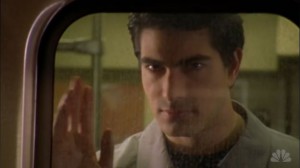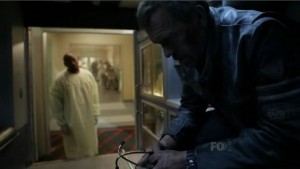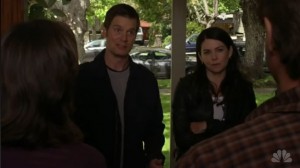“Muah ha ha.”

Where does one buy villainous trenchcoats?
The spy procedural is based on the “unreliable witness.” Espionage, as a genre, involves a number of “agents” that can turn coat on a dime or, at the whim of the show’s authors, reveal themselves to have always been a double agent without precedent. No character can be trusted with anything. In fact, not even what the audience sees can be trusted since, often, what they see is a biased version of what is actually transpiring. Nothing is reliable, not even what the viewer can testify to seeing. The abilities of spies have risen to superhuman in order to either (a) cover up narrative holes or (b) make an audience believe that this network of subterfuge, obfuscation, and coolness is believable. Spies are the new superheroes because, with a gadget or some sleight of hand, maybe even the opportunity to slip off a dress at a moment’s notices, anything is possible. For reference, see Alias, Burn Notice, or Dollhouse (though the latter has its own complications with the supernatural/extraordinary).
Chuck started like a children’s version of the spy procedural: many of the tricks of the spy trade but with this elementary element that even a goofball can do the job, if a bit clumsily. Chuck as a character is proof that spies have been elevated to something that has normally needed a cape and underwear-on-the-outside-of-the-pants to designate its superiority. We have been led to believe that he is a normal guy given extraordinary power and that is the only way he could possibly compete on the same level as his fellow agents (Walker and Casey) that received “ordinary” spy training. The thread of Chuck’s normal life kept it grounded and almost made it a parody of all those spy procedurals that take themselves so seriously.
But Chuck has been growing up over the past season and a half and has reached a sort of awkward adolescence. While the ending to Season 3 packed a few punches, it is constantly wrestling with the spy procedural genre and that which kept it grounded, a thread that was spinning out of control, the two halves of the show diverging intensely. At the end of this episode, the show seems to have made a choice. And I can’t say it made the right one. Especially since it goes into next season with what might be some heavy intra-network competition.
Read more »




